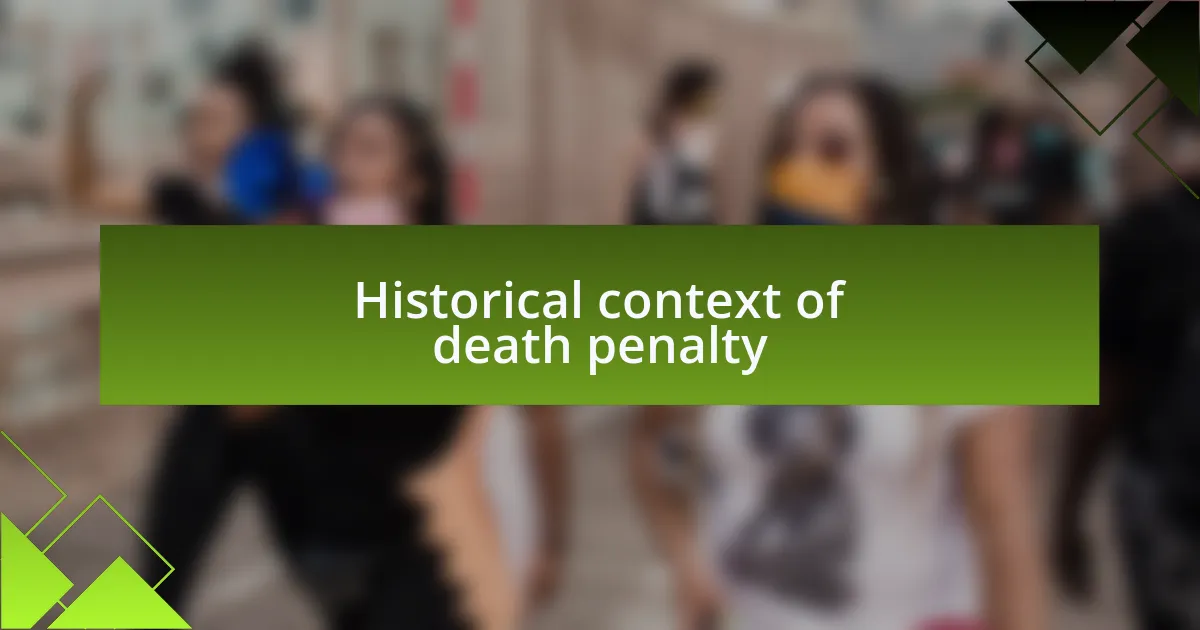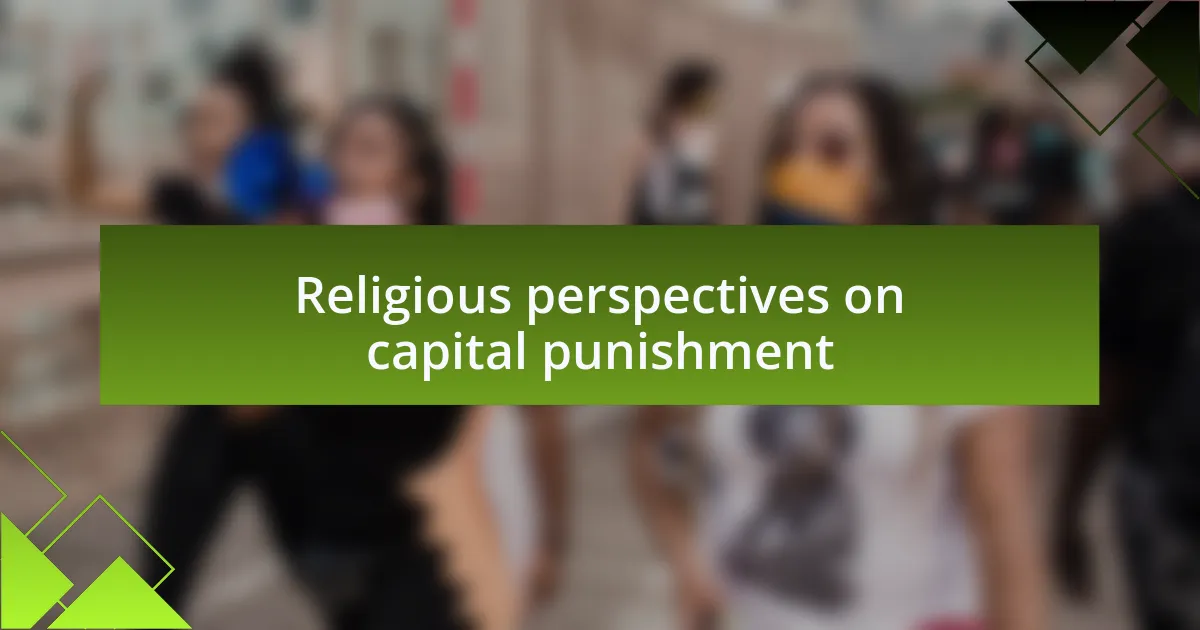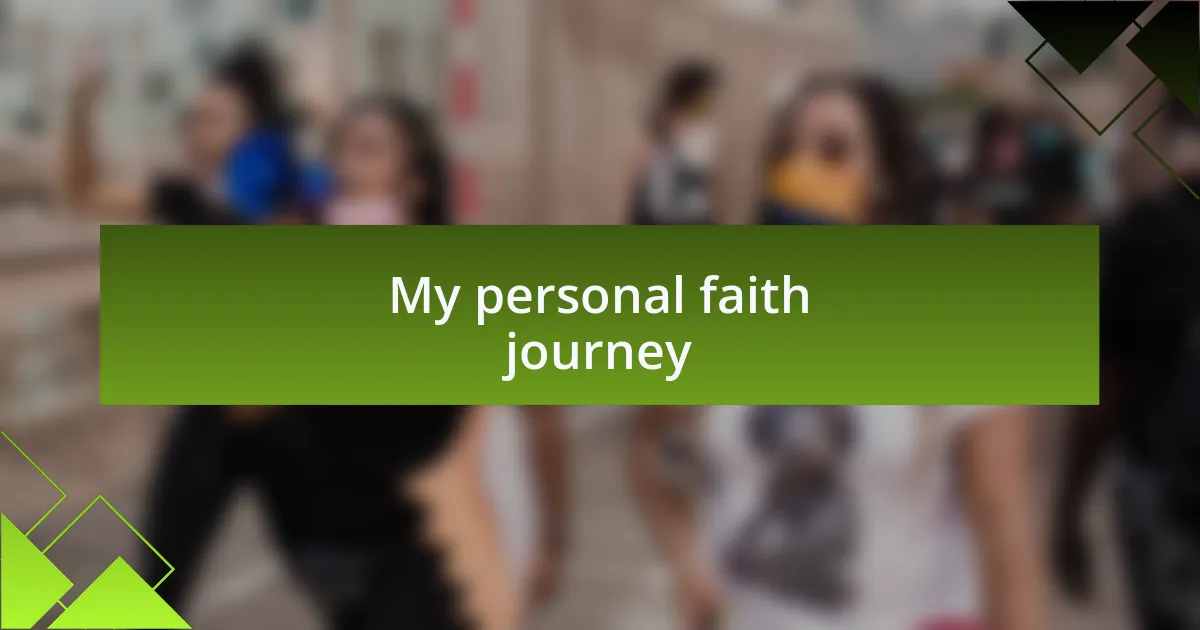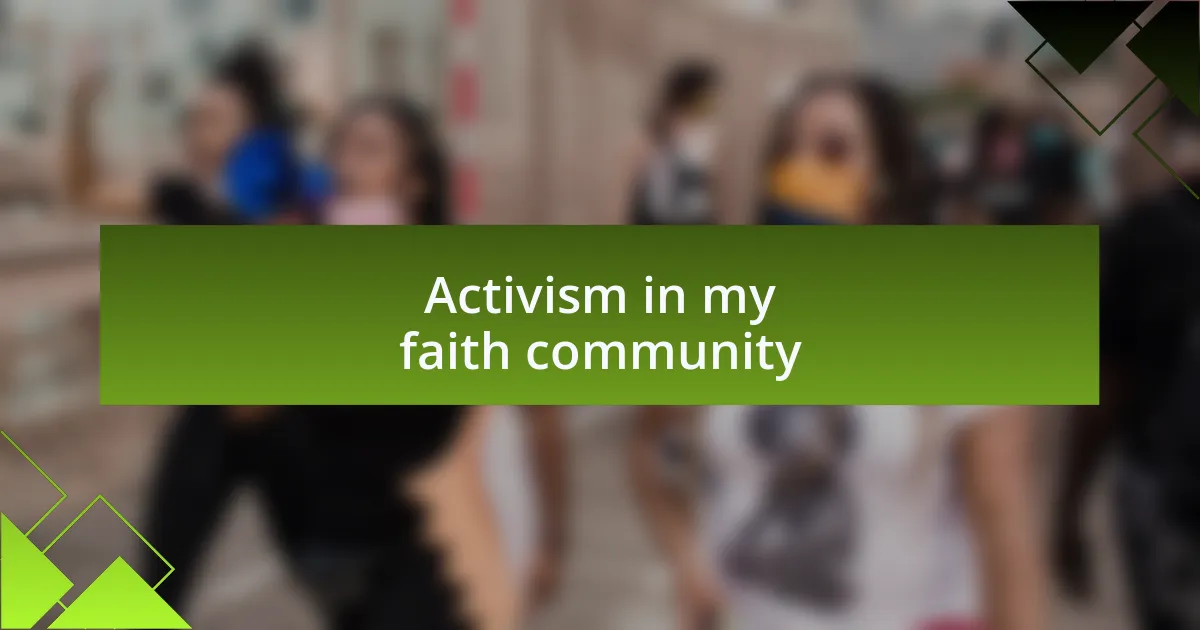Key takeaways:
- The anti-death penalty movement emphasizes the sanctity of life and advocates for systemic justice, especially for marginalized communities.
- Historical perspectives show that the death penalty has evolved from ancient practices focused on deterrence to a contemporary emphasis on human rights and compassion.
- Religious beliefs often conflict with capital punishment, promoting principles of forgiveness and mercy that challenge the legitimacy of executing individuals.
- Personal faith journeys and community activism highlight the importance of standing against the death penalty as a manifestation of shared values and a commitment to justice.

Understanding the anti-death penalty movement
The anti-death penalty movement is rooted in a profound belief in the sanctity of life and the fundamental rights of all individuals. Personally, I’ve witnessed how this belief can stir deep emotions—when I attended a vigil for a death row inmate, I felt the collective weight of sorrow and hope as we held candles, illuminating the struggles of those facing ultimate punishment. One could ask, what kind of society are we if we allow the state to take a life?
As I engaged with activists from diverse backgrounds, I began to understand the complex tapestry of motivations behind the movement. For some, it’s a response to systemic injustice that often targets marginalized communities. I recall a conversation with a group leader who shared a story about a friend wrongfully convicted, igniting a fire within me to advocate for change. Isn’t it disheartening to think that any innocent person could be subjected to such finality?
At its core, the movement challenges us to reconsider our values around justice and mercy. Each story I’ve come across reminds me that the death penalty isn’t just a legal issue; it’s a deeply personal one. Have you ever thought about the families involved—the victims and the condemned? The emotional scars run deep, influencing not only those directly affected but all of us who care about humanity.

Historical context of death penalty
Throughout history, the death penalty has been employed as a means of punishment for a variety of crimes, with roots tracing back to ancient civilizations. I remember reading about how the Code of Hammurabi, dating back to around 1754 BC, included death as a punishment for theft and other offenses. It made me wonder how our understanding of justice has evolved, or perhaps, how it has stagnated in some ways.
As I studied more recent history, I discovered that the death penalty gained traction in Europe during the Middle Ages, largely influenced by the prevailing notion of deterrence. This concept resonated with me, especially when I reflected on how society often believes that fear can curb crime. However, I can’t help but ask, has fear really led to a more just society, or has it merely created a cycle of violence and retribution?
In the 20th century, the global perspective on capital punishment began to shift, with a growing recognition of human rights. I remember feeling a profound sense of hope while attending a seminar on the abolition of the death penalty, where passionate speakers shared harrowing tales of wrongful executions. It struck me that every time a society chooses compassion over punishment, it opens the door to a more humane and just future. How can we continue to champion life in a world that still grapples with such ultimate decisions?

Religious perspectives on capital punishment
Religious perspectives on capital punishment often reveal deeply rooted beliefs about the sanctity of life. For me, growing up in a faith community, I learned that many religions emphasize forgiveness and redemption. This principle often leads to the belief that taking a life, even in the name of justice, contradicts the core teachings of compassion inherent in faith.
In my discussions with fellow members of the faith community, I encountered a range of opinions on capital punishment. While some argue that it serves as a form of divine justice, I often found myself questioning whether the notion of punishment aligns with the call to love one’s neighbor. Can we truly claim to uphold the values of kindness and mercy if we support a system that exacts the ultimate penalty?
Exploring different religious texts, I discovered varied interpretations on the issue. For instance, a Jewish friend shared insights from the Talmud, which suggests that to execute one person is akin to destroying an entire world. This perspective prompted me to reflect on the profound moral implications of our justice system. Do we consider the weight of these spiritual teachings when discussing capital punishment, or do we lose sight of their deeper messages in our pursuit of justice?

My personal faith journey
My personal faith journey has been a tapestry woven with moments of revelation and introspection. I recall a time during a youth retreat when we gathered to discuss forgiveness. Sitting in a circle, we shared our struggles with the concept of letting go, and I realized that my faith taught me to embrace mercy, not just as an ideal but as a practical way of living. It struck me: how could I reconcile my belief in love with support for a system that fosters finality?
As I continued to explore this tension, I found myself drawn into conversations that challenged my previous assumptions. I remember sitting with a mentor after a service, candidly discussing the intersections of faith and justice. He asked me, “Can we truly be agents of change if we are complicit in a system that takes away hope?” That lingering question has stayed with me, urging me to reevaluate what it means to uphold my beliefs in a complex world.
Reflecting on these experiences, I often feel a sense of responsibility. I’m compelled to advocate for those who have been marginalized by the justice system. My faith encourages me to stand up for the voiceless, pushing me to consider how my actions align with the teachings that have shaped my life. How can we claim to be followers of faith if we ignore the plight of others? This realization fuels my commitment to activism, guiding me as I navigate my path forward.

Activism in my faith community
Activism within my faith community has often meant bridging the gap between spiritual convictions and societal issues. I vividly remember a community meeting where we discussed our church’s stance on the death penalty. The room buzzed with diverse opinions, but my heart resonated with those who spoke of compassion and the fundamental right to life. I found myself wondering, how can we condone a practice that strips away the chance for redemption?
During another gathering, I participated in a candlelight vigil for victims of wrongful convictions. As I stood among fellow congregants, the glow of our candles flickering in the night, I felt an overwhelming sense of unity. Together, we prayed not just for the deceased but for justice to prevail. The collective voice uplifted my spirit, and it became clear: activism isn’t just about speaking out; it’s about embodying the love we preach.
Most recently, I engaged in a letter-writing campaign organized by my church. We reached out to lawmakers, urging them to reconsider the death penalty. Each letter felt like a small act of faith, a way to express our shared belief that every life holds significance. This experience cemented my understanding that activism in my faith community isn’t merely a task; it’s a sacred responsibility. How can we call ourselves a community if we don’t stand up for justice together?